Chris Bell, chief communications officer and senior meteorologist at Weatherquest, gave the meeting a whistlestop tour of the science behind climate change, and explained what effect it will have on agriculture over the coming decades.
Mr Bell was keen to point out that although natural climate change has happened throughout history, the impact of human activity has massively accelerated that change.
“We are at about 14°C average temperature at the moment,” he explained. “There have been times where the average temperature on Earth has been up into the low 20s, and those were the times when the dinosaurs existed and we didn't have any ice on the planet and sea levels rose - sea levels were five to six metres above where they are today.
“Even in the last 10,000 years or so, we've had climate fluctuations, and I'm sure you're all aware that the Romans were growing grapes in southern Britain. There is certainly a period in the record that shows a slightly warmer spell of weather, and we've had little mini episodes of colder weather as well.
“There are smaller fluctuations in the climate that do mean we warm and cool. But now we are increasing CO2. That's going to add more energy to the system, but there is still a record that shows temperature going up and down well before humans were burning fossil fuels. That background of climate variability is still happening and still will happen, but it will be layered into the extra energy that we are currently producing with CO2.
“Natural factors haven't suggested that we should see temperature rising as quickly as it has over the last 150 years. But if you look at the human induced factors, there is evidence that those temperatures are being affected by things that we're doing.”
Mr Bell introduced various modelling studies which predict what the effect of this climate change are likely to be between now and the year 2100 – and the impact it will have on our ability to grow the food we need.
“If we don't do much, in a worst case scenario we could see the global temperature rise by as much as 4°C over the next 70 years or so. If we do quite a lot to decrease our use of greenhouse gases, we could level out temperature rise to about a degree or so above where we were pre industrial, which would be about where we are now.
“And if we kind of level it out at a more moderate state, we're talking about another increase by about another degree from where we are now. That doesn't sound like a lot, but if we look at how that relates to sea level rise, we could see a sea level rise of about half a metre on average globally between now and 2100.
“The last time we had carbon dioxide at that level in our atmosphere, the sea levels were about 3 metres higher than they are today. It is fairly scary that we could actually see sea ice be completely gone by the end of the 21st century.”
Alongside the threat to low-lying land, the change in climate is likely to impact on farming conditions in a fundamental way, said Mr Bell.
“Between now and 2100, we will see heatwaves becoming more frequent. It will be generally wetter during autumn and winter; springs could get drier. We're expecting to see up to about four times more flash flooding events, so these will be your big convective thunderstorms in the summertime, producing more rain and more potential flash flooding.
“There is no strong signal, believe it or not, for drought in the UK. However, we are expecting hotter weather. That means in a summertime situation when you have a few weeks of dry weather, you're likely to see your soil moisture decrease more rapidly than they currently would.”
Lovewell Blake agricultural partner Ryan Lincoln, who chaired the event, said, “We all use terms such as climate change and global warming, but for farmers, understanding exactly what they mean, how they happen, and what the implications are going to be on our ability to produce the food we need is crucial.
“Chris’s presentation was eye-opening, and sparked a lively debate among those present about what we should be doing to mitigate the effects of what humans have already done to the planet – and how to avoid further damage.”
The event was one of a series of regular Farmers’ Evenings in Halesworth organised jointly by Suffolk Coastal NFU and Lovewell Blake. Details of forthcoming events will be posted at on the events page of our website.


